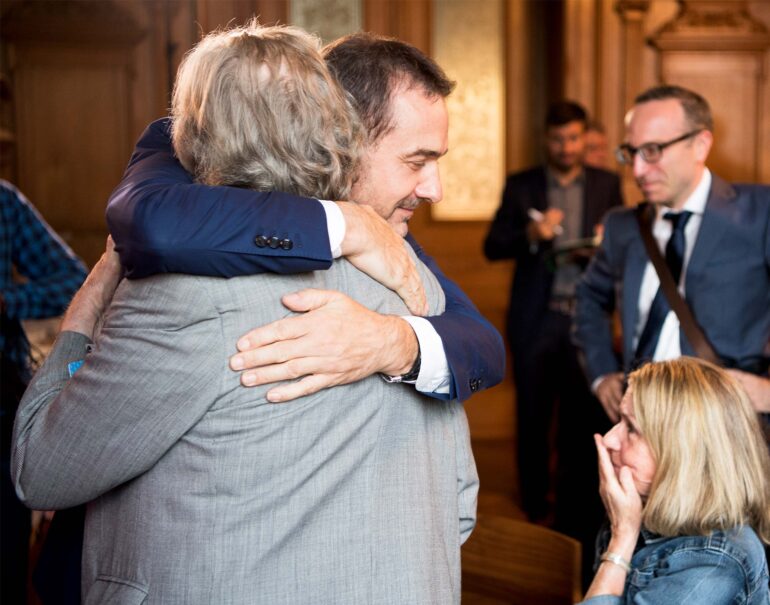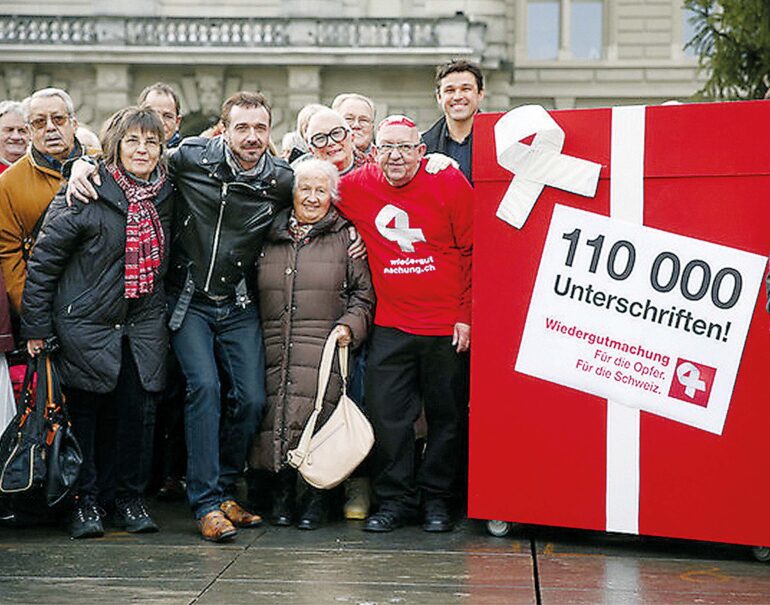Proactive by nature, when Guido Fluri recognises a need, he feels compelled to do something about it. His own experiences have had a strong influence on his philanthropic work with the Guido Fluri Foundation.
Guido Fluri’s life story has had a strong influence on his philanthropic work. His unmarried, underage mother developed schizophrenia during his early childhood, and he spent a lot of time in care. He completed his compulsory schooling in Matzendorf in Solothurn, where he lived with his grandmother. After initial difficulties finding a job, his life turned around when he began an apprenticeship as a filling station attendant. Combining tips from this job with a bank loan, he managed to buy a plot of land at the age of just 20, and built a house. The profit from the sale of that first house kick-started his career as an entrepreneur. Today an established philanthropist, he believes that ‘Modern philanthropy is about wealthy people taking responsibility.’ It is often successful entrepreneurs who have the financial clout and the network to make a difference.
The Reparation Initiative
Fluri took responsibility. As the man behind the Reparation Initiative, he forced politicians to look at the facts and to take action. In 2013, the Swiss Federal Council issued an apology to victims of the state’s former forced child labour and children’s home policies. Financial compensation, however, was not forthcoming. For Fluri, the apology alone was not enough. He channelled his anger into a campaign to demand credible reparation: ‘We are now launching a popular initiative!’ The Reparation Initiative was born. Looking back, he laughs at the memory. ‘At first it was chaos. But I realised that if the initiative was to succeed, I needed to bring together all of the victim groups.’ Fluri took up the cause through his Foundation. Alongside the demands of the parliamentary initiative, the Reparation Initiative demanded a fund for financial compensation. Fluri saw that in order to build enough support, he would need both human and financial resources. His campaign had the support of a multi-member project team, the magazine Beobachter and a cross-party committee. It took him just nine months to collect the signatures he needed. ‘We had to move quickly, because many of the victims were already old and frail,’ Fluri explains. The petition was submitted to the Federal Chancellery on 13 January 2015 and just six months later, the Federal Council presented a bill as an indirect counterproposal to the Reparation Initiative.
«We had to be quick, because many of the victims were already old and frail.»
Guido Fluri

Speaking from experience
Following the announcement of the Federal Council’s bill, the real challenge of political persuasion began. ‘We met with huge opposition. I realised straight away that I had to get the churches and the Farmers’ Union on board,’ recalls Fluri. Here, his own Protestant background helped guide him, and he was certain that he was doing the right thing. ‘It’s that message of love your neighbour, that we should help one another, even in challenging times, and not point the finger of blame,’ the Foundation’s founder emphasises. ‘That was my inner compass. I can understand if someone is ashamed of their own past because they were told again and again that they can’t do anything, that they’re worthless,’ Fluri says. He believes that a certain stigma stays with you for life. He held endless talks where he attempted to explain to sceptical politicians what it really meant to have been taken into care against the family’s will. First, he had to build bridges. ‘Today, the Guido Fluri Foundation has a good relationship with the churches, because we didn’t seek to condemn the church,’ he explains. As a result, the church circles ultimately acknowledged the initiative’s case. Fluri spoke with representatives of all parties. Because he is not a member of any party himself, he was accepted as sincere. With many SVP and FDP politicians, however, he came up against a brick wall until the parliamentary debate in April 2016. Resistance, Fluri explains, also came from the Farmers’ Union, which was afraid its members could subsequently be held to account. But that was not what the instigator of the Reparation Initiative had in mind. He was more interested in finding an overall solution for the victims. This included accepting compromises, for example in terms of solidarity contributions. His approach succeeded. Fluri won over a large majority of the national parliamentarians. The Federal Assembly approved a counterproposal that encompassed the essential points of the initiative. As a result, the initiative was withdrawn. The law came into force just one year later. Since then, 11,000 victims have received official recognition for the harm they suffered and a solidarity contribution of CHF 25,000 each. The committees continue to receive fifty to a hundred applications a month.
Long-term commitment
The national review that is currently underway is extremely comprehensive and is set to run until 2024. Fluri is convinced that ‘We need to articulate these grievances. We need to keep talking about them.’ The Foundation therefore continues to hold meetings such as this year’s summer event, which 800 former victims of forced child labour attended in a gesture of solidarity. ‘Never again!’ was the event’s motto.
Impetus behind charitable work
The initial incident that led Fluri to create the Foundation back in 2010 was being diagnosed with a benign tumour, found in the cerebellopontine angle at the base of his skull. Following the diagnosis, he researched every aspect of the condition. He wanted to know exactly what was wrong. It was difficult to find information on the rare and complex tumour in Switzerland, he explains, because with only around 50 cases a year, spread over five or so clinics, there was no in-depth expertise. ‘When I saw how difficult the situation was for sufferers,’ he comments, ‘I decided to do something to change things in Switzerland.’ Following intensive efforts, the Guido Fluri Foundation succeeded in getting a professional licence for Abolghassem Sepehrnia, an internationally renowned neurosurgeon, to practise in Switzerland. As a result, patients in Switzerland who had been diagnosed with an acoustic neuroma had the opportunity to be operated on by an experienced expert. Sepehrnia carried out several hundred operations. ‘Dealing with the issue – and the emotions it caused – from an analytical point of view gave me confidence in myself and took away my anxiety,’ Fluri comments.
In the thick of it
Fluri believes in pitching in and going where help is needed. Often, this means indescribable tragedies. ‘Whenever something happens, when I see people having to flee their homes, for example, I put myself in their shoes and then I know I need to take responsibility,’ explains the man of action. He gets projects off the ground through his Foundation. The initial spark for the easily accessible Kescha centre for the protection of children and adults was the emotional debate in the aftermath of the child murder case in Flaach. Kescha attempts to prevent escalation. Psychologists listen, take concerns seriously and search for solutions. The centre has held over 12,000 consultations in the past five years and, as a result, has been able to prevent a great deal of legal escalation. Legal representation has only had to be recommended in isolated cases.
The outbreak of the war in Ukraine also prompted Fluri to act immediately. Working with various organisations, he organised flights that eventually evacuated over 200 vulnerable children and their mothers to Switzerland. He feels that it is important to send a signal through initiatives such as this and to underline the importance of acting rather than waiting for state institutions to reach a point where they are ready to do something.
Working for a good cause
The Guido Fluri Foundation has a permanent staff of at least 20. Half a dozen of them work at Kescha in Zurich. In addition to his commitments with the Foundation, Fluri is also active at GF Group Holding AG. The family office with around a dozen employees invests in innovative businesses and currently has substantial holdings in around 35 companies. The holding company redirects around a third of its profits to the Foundation.
Wider commitment in Europe
At present, the Guido Fluri Foundation is expanding its commitment across Europe with the ‘Justice Initiative’. Following the example of the Reparation Initiative, the focus is again on child protection and prevention, and on handling allegations of abuse. Fluri has thought long and hard about how to move forward. The Foundation recently launched a travelling exhibition in Venice, which is set to visit various European cities. His concerns have also led Fluri to a long-planned audience with the Pope. ‘Everyone present agreed that it is important to look to the future in order to focus on prevention,’ Fluri says. His Foundation is to fund a professorship at the Pontifical Gregorian University from autumn 2022. The aim is that those training for the priesthood will be taught more about the subject of abuse. What is abuse? Where does it begin and, above all, how can we prevent it?






